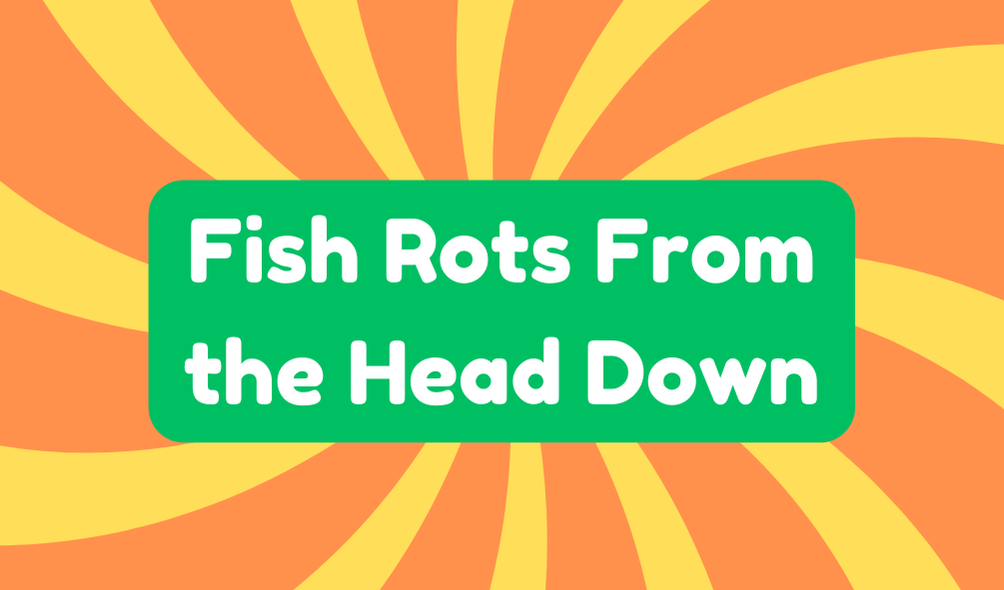The proverb "fish rots from the head down" underscores the significant importance of leadership in any organization. It suggests that effective leadership is essential for organizational health, while weak leadership can trigger systemic failures. When leaders neglect employee welfare or avoid accountability, the entire organization suffers. Historical context shows that this idea has appeared in various cultures, highlighting the universal recognition of leadership's influence. In modern times, ethical leadership and transparent communication are imperative for fostering positive environments. Understanding these dynamics can illuminate the core of organizational challenges, and there is much more to uncover about this topic.
Synonyms
When discussing the proverb "Fish rots from the head down," several synonyms effectively capture its essence regarding the impact of leadership on organizations. These phrases highlight the important link between leadership efficacy and organizational integrity:
- Leadership is the compass: Effective leaders guide organizations in the right direction.
- The foundation of failure: Weak leadership can lead to systemic breakdowns.
- The trickle-down effect: Decisions at the top create ripples affecting the entire organization.
- Frontline reflections: Employee performance mirrors leadership quality and integrity.
Each synonym underscores the idea that leadership greatly influences group dynamics and overall performance. Strong leadership is not merely advantageous; it is essential, as poor leadership often translates into diminished organizational health and integrity. Recognizing these synonyms can foster a deeper understanding of leadership's pivotal role.
Example of Sentences
Understanding the proverb "Fish rots from the head down" illuminates the profound consequences of leadership on organizational health. This adage serves as a lens through which we can assess the impact of leadership failures that often precipitate organizational decay. Consider these examples:
- A startup's dismal performance reflected its founder's inability to execute a clear vision.
- The decline of a reputable company stemmed from a CEO who neglected employee welfare.
- When leaders evade accountability, morale plummets, creating a toxic environment.
- A groundbreaking idea fails to thrive when the management lacks foresight and innovation.
These scenarios underscore how leadership shapes not only the trajectory of organizations but also their ultimate viability. Strong leadership is not merely beneficial; it is essential for organizational success and cultivation of a positive culture.
Origin
The proverb "Fish rots from the head down" has its roots in historical observations of leadership dynamics, tracing back to the work of Sir James Porter in 1768, where he examined Turkish society. This saying highlights the critical link between leadership and organizational decay across cultures. Its historical significance underscores how leaders set a tone that permeates their organizations, affecting performance and morale.
| Cultural Context | Historical Significance |
|---|---|
| Turkish: "Balık baştan kokar" | Reflects societal views on leadership failure |
| Russian: "Гниение идет сверху" | Emphasizes top-down effects of poor leadership |
| Greek tragedy lessons | Teaches consequences of leaders' actions on followers |
Recognizing these variations enhances our understanding of accountability in leadership, promoting the need for responsible guidance across all sectors.
Collocations
Collocations related to the proverb "Fish rots from the head down" emphasize the intrinsic link between leadership and organizational outcomes. They illustrate how leadership accountability and organizational integrity are interwoven in shaping a company's culture. A few key collocations include:
- Lead by example – Effective leaders model the behavior they wish to see.
- Accountability at the top – Leaders should embrace their role in organizational success or failure.
- Ethical leadership practices – Engaging in morally sound decisions fosters a positive environment.
- Transparent communication – Open dialogue at all levels enhances trust and integrity.
These collocations reflect a critical truth: when leaders neglect their responsibilities, the entire organization suffers, illuminating the need for proactive leadership in cultivating a thriving workplace.
How to Use in Everyday Language
While discussing organizational challenges, one can effectively incorporate the proverb "fish rots from the head down" to highlight the significance of leadership accountability. This phrase serves as a reminder that leadership impact directly correlates with organizational integrity. To help individuals incorporate this concept into everyday language, consider the following examples:
| Scenario | Usage of Proverb | Outcome |
|---|---|---|
| Company experiencing decline | "The team's morale faded; fish rots from the head down." | Acknowledges blame on leaders |
| Leadership neglect | "If the project fails, remember, fish rots from the head down." | Emphasizes accountability |
| Ethical lapses | "Poor values will poison our culture; fish rots from the head down." | Urges ethical leadership |
| Employee turnover | "High turnover rates signal issues; fish rots from the head down." | Highlights responsibility |
| Innovation stagnation | "To boost creativity, we must lead well; fish rots from the head down." | Pushes for effective leadership |
These examples offer a framework to discuss the interplay between leadership and organizational health.
Why Is It Still Relevant Today?
Leadership remains a focal point in discussions about organizational success, reinforcing the proverb "fish rots from the head down." In today's fast-paced and ever-evolving business landscape, the implications of this saying resonate profoundly. Leadership failure at the top levels can initiate a spiral toward organizational decline, impacting employee morale and productivity. When leaders neglect their responsibilities or exhibit unethical behavior, the repercussions trickle down, creating a toxic environment that stifles innovation and growth. Consequently, organizations must prioritize strong, ethical leadership to cultivate a healthy, thriving workplace. Understanding that the foundation of success rests upon accountable leadership emphasizes the necessity for organizations to adopt effective leadership strategies, ensuring that the 'head' of the fish remains vibrant and free from decay.






